KI-Sprachagenten-Plattformen sind entscheidend für Unternehmen, die ihren Kundenservice verbessern und Kommunikationsprozesse optimieren möchten. Angesichts der Vielzahl an verfügbaren Optionen, die jeweils einzigartige Funktionen und Fähigkeiten bieten, kann die Auswahl der richtigen Plattform eine Herausforderung sein. Dieser Artikel zielt darauf ab, die Landschaft der KI-Sprachagenten-Plattformen zu entmystifizieren, indem er die besten Anbieter vergleicht.
Was ist ein KI-Sprachagent?
Ein KI-Sprachagent ist eine Art von konversationalem KI-Sprachassistenten, der entwickelt wurde, um menschenähnliche Interaktionen zu simulieren, Gespräche autonom und kontextbewusst zu führen, ähnlich einem virtuellen Empfangsmitarbeiter. Diese KI-Agenten arbeiten rund um die Uhr unermüdlich und bieten Unterstützung ohne die Einschränkungen menschlicher Grenzen. Durch den Einsatz von Techniken wie natürlicher Sprachverarbeitung und maschinellem Lernen sind KI-Sprachagenten darauf ausgelegt, den Kundenservice zu verbessern, indem sie Telefonanrufe verwalten und sogar Terminvereinbarungen effizient abwickeln, um sicherzustellen, dass jede Interaktion mit der Genauigkeit und persönlichen Aufmerksamkeit behandelt wird, die man von einem menschlichen Agenten erwarten würde.
Wie funktionieren KI-Sprachagenten?
KI-Sprachagenten fungieren als virtuelle Empfangsmitarbeiter, die Anrufe in Echtzeit beantworten, um nahtlose Interaktionen und Unterstützung zu bieten. Angetrieben von fortschrittlichen Large Language Models (LLMs) verarbeiten und verstehen diese Systeme natürliche Sprache, was ihnen ermöglicht, bedeutungsvolle, menschenähnliche Gespräche zu führen. Wenn ein Nutzer eine bestimmte Telefonnummer wählt, nimmt der KI-Sprachagent den Anruf entgegen und nutzt Technologien mit niedriger Latenz, um Verzögerungen zu minimieren und ein reibungsloses Benutzererlebnis zu gewährleisten. Diese schnelle Reaktionsfähigkeit ermöglicht es der KI, Aufgaben wie Terminplanung, Beantwortung von Anfragen oder Weiterleitung von Anrufen effizient zu erledigen und Unternehmen eine zuverlässige und skalierbare Lösung für die Kommunikationsverwaltung zu bieten.
Anwendungsfälle von KI-Sprachagenten
Künstliche Intelligenz-Agenten verändern die Art und Weise, wie wir mit digitalen Systemen interagieren, indem sie Effizienz und verbesserte Entscheidungsfindung in verschiedene Branchen bringen. Hier sind einige wichtige Anwendungsfälle für KI-Agenten, die ihre Rolle in modernen Geschäfts- und Technologielandschaften veranschaulichen:
- Kundendienst: KI-Agenten können routinemäßige Kundenanfragen und Supportaufgaben bearbeiten, Wartezeiten verkürzen und menschliche Mitarbeiter für komplexere Probleme freisetzen.
- Gesundheitswesen Unterstützung: KI-Agenten können bei der Patientenverwaltung helfen, indem sie Termine vereinbaren, Patienten an Medikamente erinnern und grundlegende Gesundheitsratschläge geben.
- Finanzdienstleistungen: KI-Agenten können im Finanzwesen eingesetzt werden, um Markttrends zu analysieren, bei der persönlichen Bankberatung zu helfen und Echtzeit-Investitionsberatung zu bieten.
- E-Commerce: Im E-Commerce können KI-Agenten das Einkaufserlebnis personalisieren, indem sie Produkte basierend auf dem Nutzerverhalten und den Vorlieben empfehlen.
- Personalwesen: KI-Agenten können HR-Prozesse optimieren, indem sie die Vorauswahl von Kandidaten automatisieren, Onboarding-Verfahren erleichtern und Mitarbeiteranfragen verwalten.
- Bildung: KI-Agenten können Bildungsinitiativen unterstützen, indem sie Studentenfragen in Echtzeit beantworten und so das Lernerlebnis verbessern.
- Marketing: Diese Agenten unterstützen im Marketing, indem sie Verbraucherdaten analysieren, um gezielte Werbekampagnen zu erstellen und Kunden durch personalisierte Kommunikation zu binden.
Wichtige Funktionen von KI-Sprachagenten-Plattformen
Die meisten KI-Sprachagenten Plattformen bieten eine Reihe von Funktionen, die darauf abzielen, Kundeninteraktionen zu verbessern und Routineaufgaben zu automatisieren. Zu den wichtigsten Funktionen gehören in der Regel:
- Echtzeit-Transkription und Gesprächsfluss-Management: Echtzeit-Transkription und Gesprächsfluss-Management stellen sicher, dass jede Kundeninteraktion genau erfasst wird, was Qualitätssicherung und Nachverfolgungsmaßnahmen ermöglicht.
- Natürliche Gespräche: Menschliche Sprachfähigkeiten verbessern das Benutzererlebnis, indem sie Interaktionen ansprechender und weniger mechanisch gestalten.
- Automatisierung von eingehenden und ausgehenden Anrufen: Die Automatisierung von eingehenden und ausgehenden Anrufen reduziert Wartezeiten und Betriebskosten, indem häufige Anfragen und Nachverfolgungen automatisch bearbeitet werden.
- Integration mit bestehenden Systemen: Die Integration mit bestehenden Systemen bietet nahtlose Verbindungen zu CRM-Plattformen, Gesundheitssystemen und anderen Unternehmenswerkzeugen, um ein einheitliches Kundenerlebnis zu liefern.
- No-Code-Anpassung: No-Code-Anpassung ermöglicht es Unternehmen, ihre KI-Sprachagenten einfach zu konfigurieren und anzupassen, ohne umfangreiche Programmierkenntnisse zu benötigen.
- Metriken und Analysen: Metriken und Analysen bieten detaillierte Einblicke in Anrufmuster, Agentenleistung und Kundenzufriedenheit, was datenbasierte Entscheidungen ermöglicht.
Faktoren, die bei der Auswahl einer KI-Sprachagenten-Plattform zu berücksichtigen sind
Die Auswahl der richtigen KI-Sprachagenten Plattform ist eine entscheidende Entscheidung, die die Fähigkeit Ihres Unternehmens, nahtlose und effektive Kundeninteraktionen zu bieten, erheblich beeinflussen kann. Angesichts der Vielzahl verfügbarer Plattformen ist es wichtig, wesentliche Faktoren wie zu bewerten:
- Kompatibilität mit bestehenden Systemen: Stellen Sie sicher, dass die Plattform sich problemlos in Ihre aktuelle Technologielandschaft integrieren lässt.
- Skalierbarkeit und Integrationsfähigkeiten: Die Plattform sollte mit den Anforderungen Ihres Unternehmens wachsen und sich nahtlos mit anderen Tools und Anwendungen verbinden lassen.
- Benutzeroberfläche: Eine einfache und intuitive Oberfläche ist entscheidend für die Verwaltung und Anpassung des KI-Agenten.
- Kostenüberlegungen: Bewerten Sie die Preisstrukturen, um eine Option zu finden, die den besten Wert für Ihre spezifischen Anwendungsfälle bietet.
Warum Sie Ihre eigenen KI-Agenten entwickeln sollten statt vorgefertigte Plattformen zu nutzen
Während vorgefertigte KI-Sprachagenten SaaS-Plattformen der schnellste Weg zur Einführung zu sein scheinen, bietet der Aufbau eigener KI-Agenten unvergleichliche Anpassungsmöglichkeiten, Kontrolle und langfristigen Wert. Maßgeschneiderte KI-Agenten, wie die mit der Speechify Text-to-Speech API entwickelten, ermöglichen es Ihnen, Lösungen zu erstellen, die genau auf Ihre geschäftlichen Anforderungen zugeschnitten sind, im Gegensatz zu generischen vorgefertigten Plattformen. Die Entwicklung eigener Agenten gewährleistet auch die volle Kontrolle über Ihre Daten, was die Sicherheit und Einhaltung von Datenschutzbestimmungen verbessert. Darüber hinaus sind maßgeschneiderte KI-Lösungen mit Blick auf Skalierbarkeit konzipiert, sodass sie mit Ihrem Unternehmen wachsen und zukunftssicher bleiben. Der interne Aufbau von KI-Agenten vermittelt Ihrem Team wertvolle praktische Erfahrungen und ein tieferes Verständnis der KI-Technologie, fördert Innovationen und positioniert Ihr Unternehmen für nachhaltigen Erfolg.
Vergleich beliebter KI-Sprachagenten-Plattformen
Vorgefertigte KI-Sprachagenten Plattformen haben die Art und Weise verändert, wie Unternehmen konversationelle KI implementieren, indem sie einsatzbereite Lösungen anbieten. Zahlreiche Plattformen sind entstanden, die jeweils einzigartige Funktionen und Fähigkeiten bieten, um den unterschiedlichen Geschäftsanforderungen gerecht zu werden. Der Vergleich dieser KI-Sprachagenten Plattformen erfordert die Analyse ihrer Stärken sowie das Verständnis ihrer Einschränkungen. Werfen wir einen Blick darauf, wie die beliebtesten KI-Sprachagenten Plattformen abschneiden:
Vapi.ai
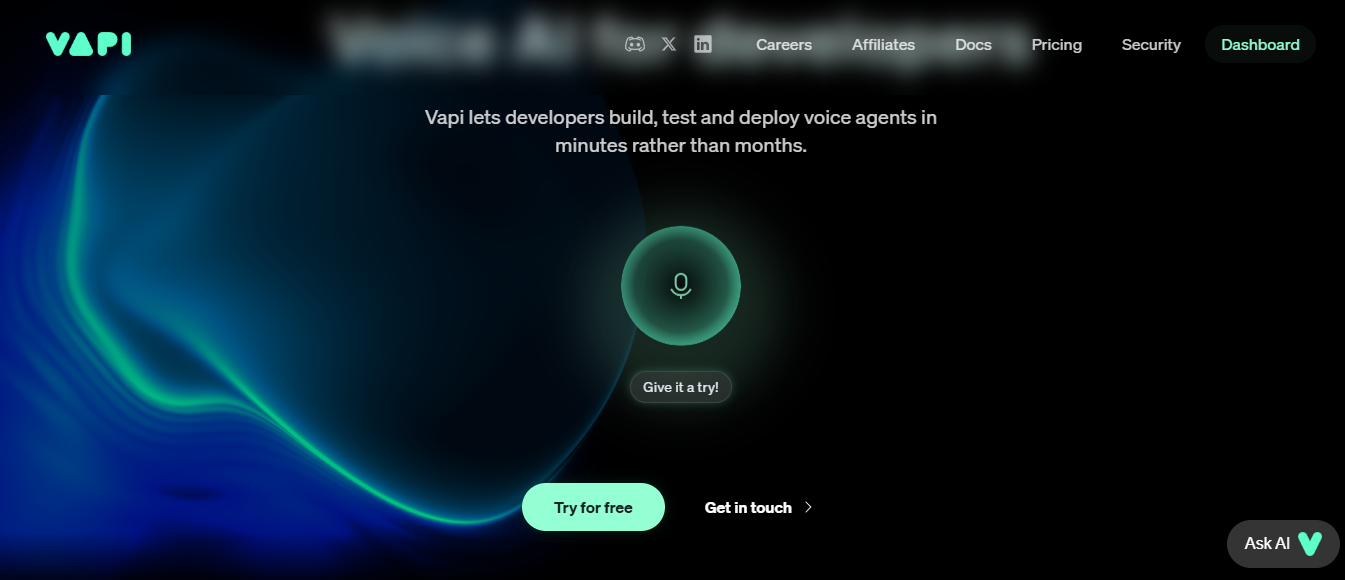
Vapi.ai ist eine leistungsstarke Plattform, die für Entwickler konzipiert ist, um Sprach-KI-Agenten schnell und effizient zu erstellen, zu testen und bereitzustellen. Sie bietet eine umfassende Suite von Tools, darunter eine Voice Bot API, SDKs und ein Entwickler-Dashboard, das die Integration von Sprachfunktionen in verschiedene Anwendungen auf Plattformen wie Web und Mobil vereinfacht. Vapi.ai wird für seine benutzerfreundliche Oberfläche gelobt, die die Bereitstellung und Verwaltung von Sprachagenten erleichtert, und seine Anpassungsfähigkeit in verschiedenen Branchen, einschließlich Gesundheitswesen und E-Commerce. Die Plattform unterstützt über 100 Sprachen und ist bekannt für ihr Streaming mit niedriger Latenz, das Echtzeit- und natürliche Interaktionen gewährleistet.
Vorteile von Vapi.ai
- Verbesserte Benutzererfahrung: Vapi.ai verbessert Benutzerinteraktionen durch reaktionsschnelle und intelligente Sprachkommunikation.
- Skalierbarkeit: Die Plattform skaliert problemlos und passt sich wachsenden Geschäftsanforderungen an, ohne an Leistung zu verlieren.
- Kosteneffektiv: Vapi.ai bietet erschwingliche Lösungen, die die Betriebskosten senken und gleichzeitig qualitativ hochwertigen Service bieten.
Nachteile von Vapi.ai
- Lernkurve: Neue Benutzer könnten eine steile Lernkurve mit den fortgeschrittenen Funktionen von Vapi.ai erleben.
- Latenzprobleme: Die Plattform leidet manchmal unter Latenzproblemen, die Echtzeit-Sprachinteraktionen beeinträchtigen.
- Langsamer Support: Kundensupport Reaktionszeiten sind langsamer als erwartet, was die Lösung von Problemen verzögern kann.
Air.ai
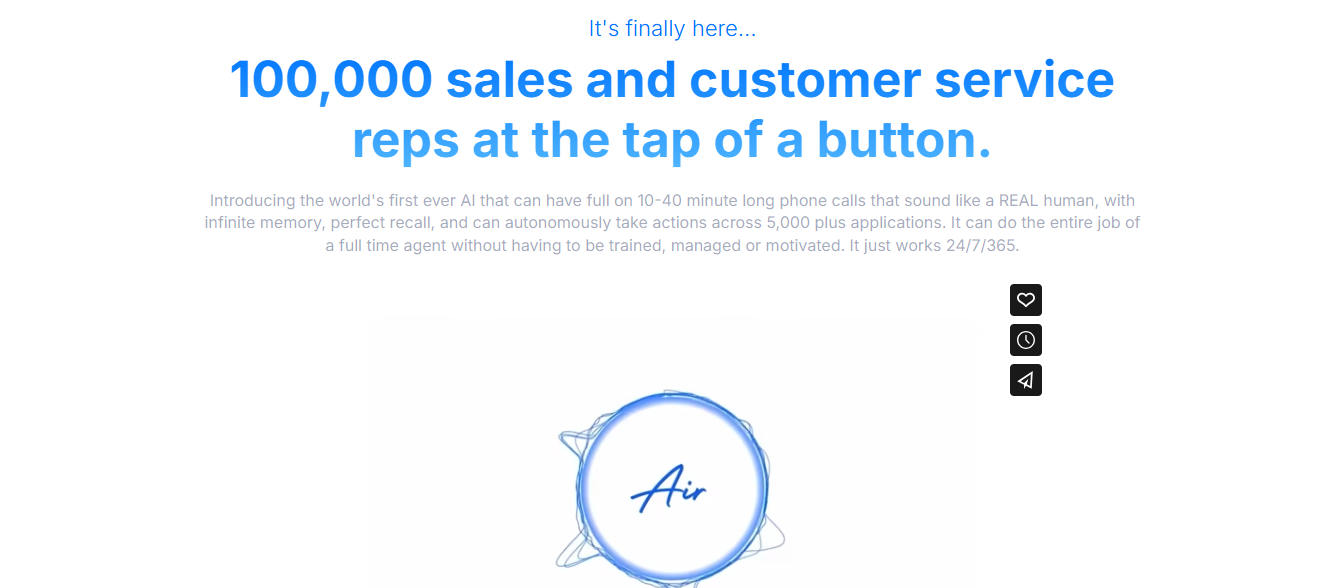
Air.ai ist eine fortschrittliche Konversations-KI-Plattform, die entwickelt wurde, um natürliche, menschenähnliche Telefongespräche für Zwecke wie Verkauf und Kundendienst zu erleichtern. Diese KI kann längere Gespräche von 10 bis 40 Minuten ohne menschliches Eingreifen führen, was sie äußerst effizient für die Verwaltung von Kundeninteraktionen in verschiedenen Branchen macht. Sie ist bekannt für ihre Fähigkeit, sich mit über 5.000 Anwendungen zu integrieren, was es ihr ermöglicht, eine Vielzahl von Aufgaben autonom zu erledigen. Darüber hinaus Air.ai bietet eine beeindruckende Funktionsvielfalt, darunter unbegrenztes Gedächtnis, perfekte Erinnerung und 24/7-Verfügbarkeit.
Vorteile von Air.ai
- Perfekte Erinnerung: Air.ai vergisst nie ein Gespräch und sorgt für detaillierte und genaue Nachverfolgungen.
- Unbegrenztes Gedächtnis: Die Plattform kann mühelos große Mengen an Informationen speichern und abrufen.
- Fähigkeit, lange Anrufe zu bearbeiten: Air.ai glänzt bei der Verwaltung von längeren Sprachinteraktionen ohne Qualitätsverlust.
Nachteile von Air.ai
- Hohe Kosten pro ausgehendem Anruf: Die Tarife für ausgehende Anrufe sind bemerkenswert hoch, was die Betriebskosten erhöhen kann.
- Schwierig zu kündigen: Die Beendigung des Dienstes mit Air.ai kann ein komplexer und frustrierender Prozess sein.
- Erfordert technisches Wissen: Die effektive Nutzung von Air.ai erfordert ein höheres Maß an technischem Fachwissen von den Nutzern.
Bland.ai

Bland AI ist eine ausgeklügelte Plattform, die darauf ausgelegt ist, Telefonanrufe mithilfe von Konversations-KI zu automatisieren, speziell für Unternehmen. Sie ermöglicht die Anpassung von Sprachagenten, die Anrufe rund um die Uhr in jeder Stimme oder Sprache bearbeiten können, was sie äußerst anpassungsfähig an verschiedene Geschäftsanforderungen macht. Die Plattform zeichnet sich durch ihre Fähigkeit aus, große Mengen an Anrufen zu verwalten, sodass Unternehmen ihre Kommunikationsprozesse effizient automatisieren können. Bland AI legt Wert auf Geschwindigkeit mit Antwortzeiten unter 400 ms, Flexibilität durch Open-Source-Modelle für tiefgehende Anpassungen und Einfachheit durch ihren Zapier-ähnlichen Workflow-Builder, der es auch nicht-technischen Nutzern ermöglicht, benutzerdefinierte KI-Sprachagenten zu erstellen und bereitzustellen.
Vorteile von Bland.ai
- Zapier-ähnlicher Workflow-Builder: Bland.ai bietet einen intuitiven Workflow-Builder, der verschiedene Apps und Dienste integriert.
- Sprachoptionen: Bietet mehrere Sprachfähigkeiten, um eine vielfältige Benutzerbasis zu bedienen.
- Schnelle Antwortzeiten: Nutzer erleben minimale Verzögerungen, was die Kommunikationseffizienz steigert.
Nachteile von Bland.ai
- Lernkurve: Bland.ai erfordert eine gewisse Einarbeitungszeit, um seine Fähigkeiten voll auszuschöpfen.
- Verwirrungsprobleme: Die KI kann gelegentlich Eingaben falsch interpretieren oder während der Interaktionen verwirrt werden.
- Erweiterte Funktionen kosten mehr: Der Zugriff auf erweiterte Funktionen erfordert zusätzliche Investitionen.
Retell
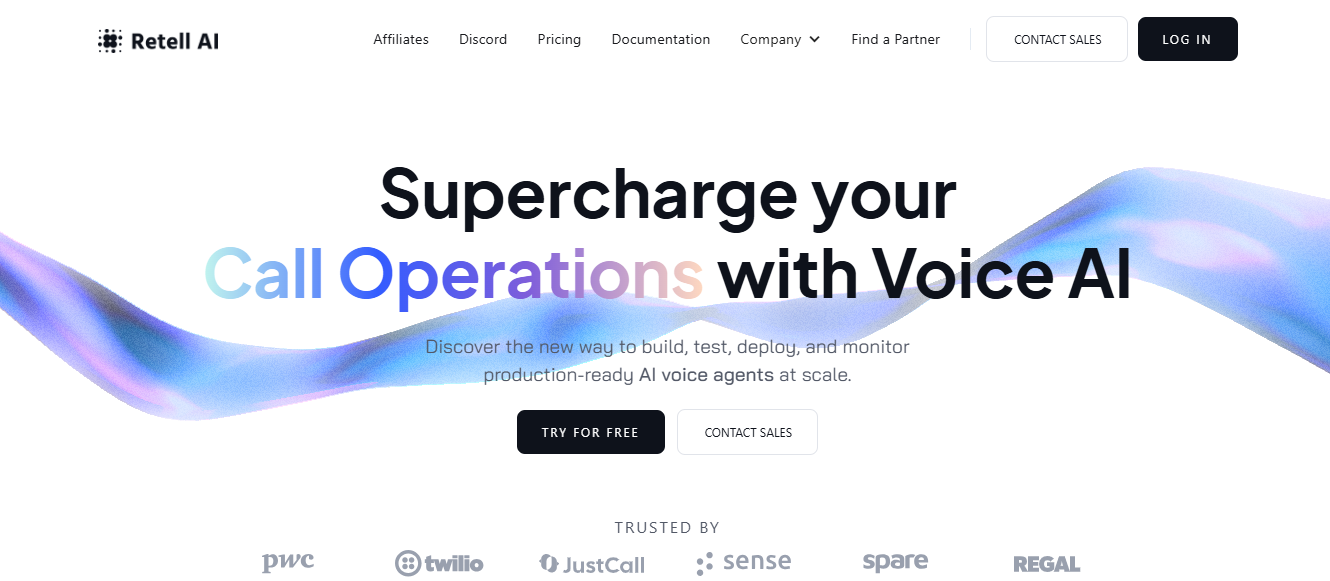
Retell AI ist eine innovative Plattform, die Unternehmen befähigt, KI-gesteuerte Sprachagenten zu erstellen und zu verwalten, die Kundeninteraktionen mit menschlicher Natürlichkeit abwickeln können. Entwickelt, um Aufgaben wie Terminplanung, Lead-Qualifizierung und Kundensupport zu automatisieren, Retell AI integriert sich nahtlos in bestehende Telefonsysteme, um die betriebliche Effizienz zu steigern. Seine fortschrittlichen Sprachmodelle, minimale Latenz und benutzerfreundliche Oberfläche sorgen für reibungslose und ansprechende Gespräche, was es zu einer idealen Wahl für Unternehmen macht, die ihre Abläufe skalieren möchten, ohne die Kundenzufriedenheit zu beeinträchtigen.
Vorteile von Retell
- Natürliche Stimmen: Retell verwendet lebensechte Stimmen, die die Benutzerbindung erheblich verbessern.
- Schnelle Latenz: Die Plattform sorgt für schnelle Verarbeitung, um Wartezeiten bei Interaktionen zu minimieren.
- Benutzerfreundliche Oberfläche: Retell ist auf einfache Bedienung ausgelegt, sodass komplexe Funktionen für alle zugänglich sind.
Nachteile von Retell
- Eingeschränkte Anpassungsmöglichkeiten: Die Optionen zur Stimm-Anpassung, insbesondere männliche Stimmen, sind begrenzt.
- Begrenzte Einsatzkapazität: Es gibt eine Obergrenze für die Anzahl gleichzeitiger Agenten, was die Skalierbarkeit einschränken könnte.
- Hohe Kosten für Skalierbarkeit: Die Erweiterung der Dienstleistungsfähigkeiten verursacht erhebliche Kosten.
OneAI
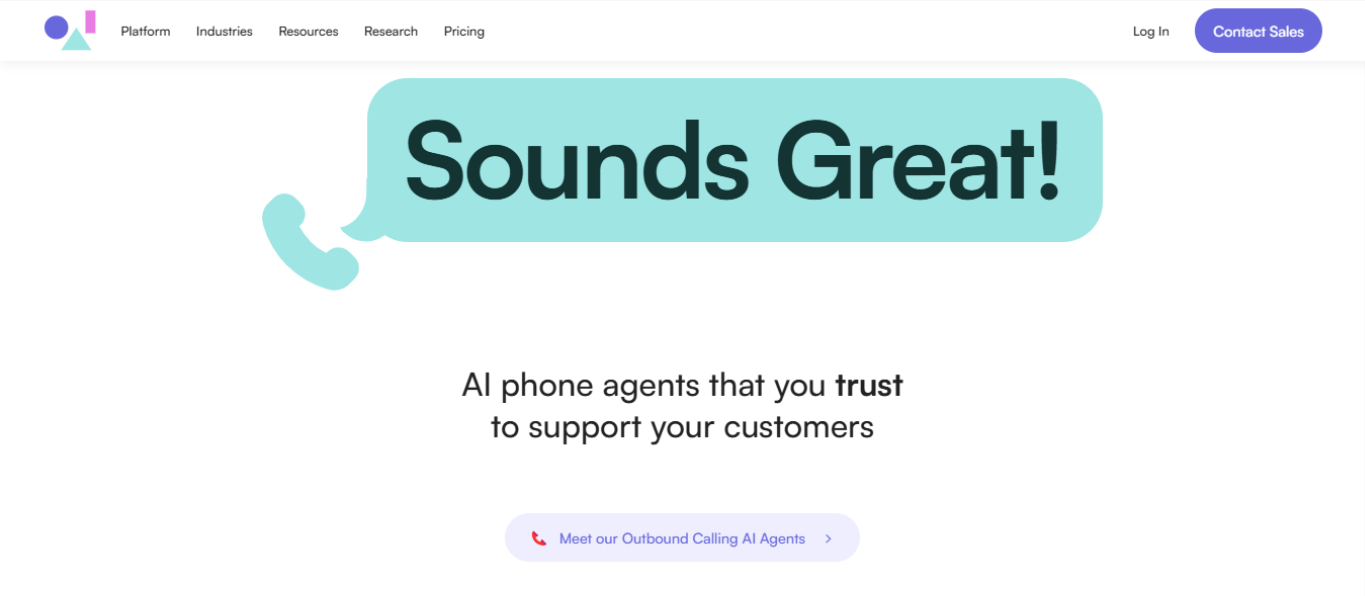
OneAI bietet fortschrittliche KI-Telefonagenten, die Kundeninteraktionen verbessern, indem sie Aufgaben wie Terminplanung, Lead-Verifizierung und ausgehende Anrufe automatisieren. Diese Agenten führen natürliche, menschenähnliche Gespräche, um ein nahtloses Erlebnis für Kunden zu gewährleisten. OneAI's Plattform integriert sich mühelos in bestehende Telefonie- und Planungssysteme, sodass Unternehmen Effizienz steigern und Abläufe optimieren können. Mit Funktionen wie 24/7-Verfügbarkeit und der Fähigkeit, IVRs und Gatekeeper zu umgehen, sind die Telefonagenten von OneAI darauf ausgelegt, die Verkaufseffizienz und Kundensupport in verschiedenen Branchen zu verbessern.
Vorteile von OneAI
- Immer im Skript: OneAI folgt konsequent vorgegebenen Skripten und sorgt so für zuverlässige Kommunikation.
- Große Auswahl an Stimmen und Akzenten: Bietet eine breite Palette von Stimmoptionen, um unterschiedlichen Vorlieben und Bedürfnissen gerecht zu werden.
- Multikanal-Kommunikation: Unterstützt verschiedene Kommunikationskanäle und erweitert die Benutzerbindung.
Nachteile von OneAI
- Gelegentliche falsche Auslöser: Manchmal werden die richtigen benutzerdefinierten Aktionen nicht ausgelöst, was zu Unzufriedenheit bei den Nutzern führt.
- Integrationsherausforderungen: Die Einrichtung und Integration von OneAI kann zeitaufwendig und komplex sein.
- Einschränkungen der Generativen KI: Es gibt inhärente Einschränkungen in der Fähigkeit der KI, kontextuell angemessene Inhalte zu generieren.
SalesAi
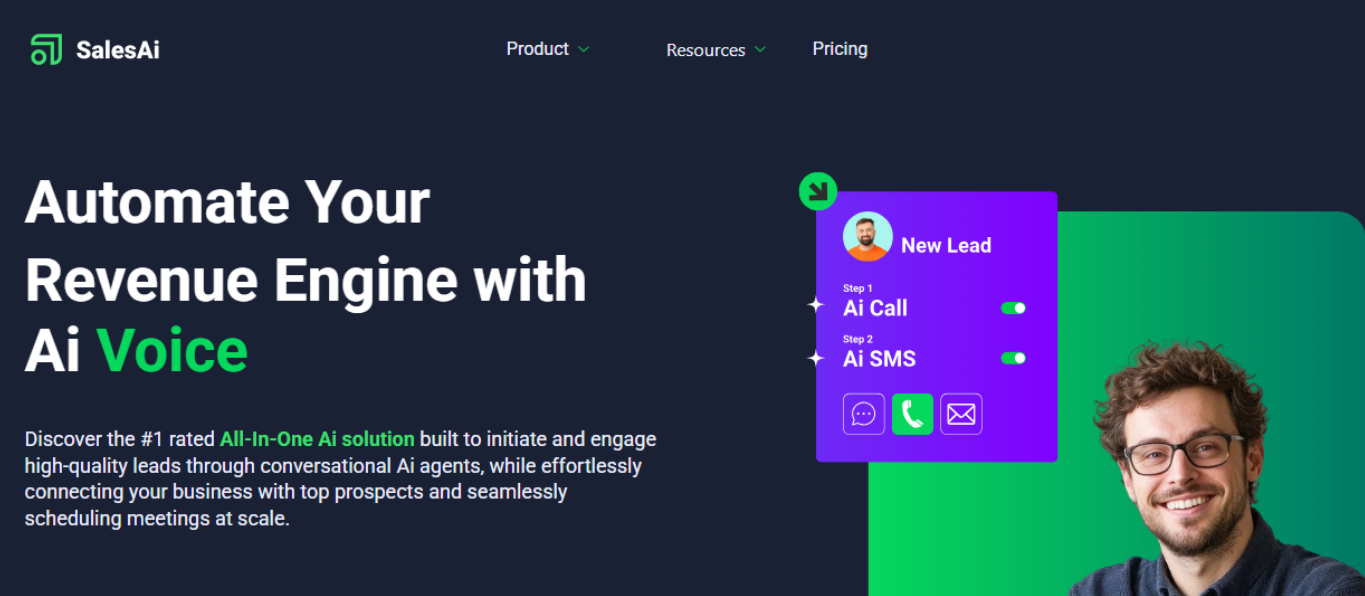
SalesAi bietet KI-gestützte Sprachagenten, die hochwertige Interaktionen mit Interessenten durch Automatisierung erleichtern, was zu mehr gebuchten Meetings und Umsatzwachstum führt. Diese KI-Sprachagenten führen natürliche, personalisierte Gespräche, überwinden Einwände und erfassen wichtige Kundenbedürfnisse während der Anrufe. Sie arbeiten rund um die Uhr und können bis zu 1.800 Anrufe pro Minute bearbeiten, was Skalierbarkeit und Effizienz in der Kontaktaufnahme gewährleistet. SalesAi's Plattform bietet auch Funktionen wie Round-Robin- und Einzelbuchungen, mehrsprachige Fähigkeiten und nahtlose Integration mit bestehenden Systemen, was sie zu einer umfassenden Lösung für die Automatisierung von Umsatzmotoren macht.
Vorteile von SalesAi
- Umfassendes Training: SalesAi bietet umfangreiche Schulungsressourcen, die die Benutzerkompetenz fördern.
- Effizienz und Zeitersparnis: Automatisiert sich wiederholende Aufgaben, sodass sich Benutzer auf strategischere Aktivitäten konzentrieren können.
- Benutzerfreundlich: Entwickelt für einfache Bedienung, sodass Benutzer schnell die Fähigkeiten nutzen können.
Nachteile von SalesAi
- Viele Bugs: Nutzer berichten von häufigen Fehlern, die den normalen Betrieb stören.
- Probleme bei der Kündigung: Nutzer stoßen auf Schwierigkeiten, wenn sie ihren Dienst kündigen möchten.
- Langsamer Support: Die Reaktionszeit des Kundensupports ist oft unzureichend, was die Problemlösung beeinträchtigt.
JustCall
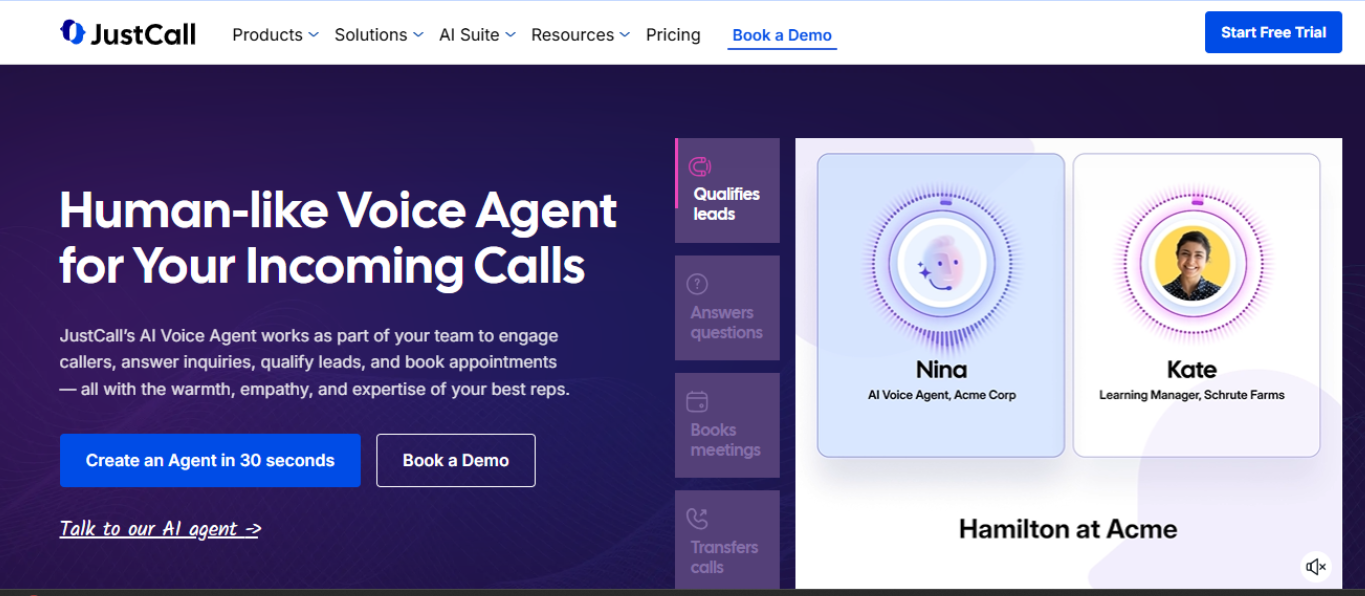
JustCall's AI Voice Agent ist darauf ausgelegt, Kundeninteraktionen zu automatisieren, indem es Routineanrufe bearbeitet, sofortige Antworten liefert und bei Aufgaben wie Terminplanung und Bestellabwicklung unterstützt. Durch die Integration in bestehende CRM- und Supportsysteme sorgt der JustCall's AI Voice Agent für nahtlose Kommunikation und verbessert das Kundenerlebnis. Die Plattform bietet Funktionen wie Anrufweiterleitung, Spracherkennung und Echtzeitanalysen, die Unternehmen helfen, die Effizienz zu steigern und sich auf komplexe Kundenbedürfnisse zu konzentrieren.
Vorteile von JustCall
- Integrationsmöglichkeiten: JustCall integriert sich mit über 100 CRM-, Verkaufs- und Produktivitätsplattformen, was seine Nützlichkeit bei der Verwaltung von Kundeninteraktionen und der Optimierung von Arbeitsabläufen erhöht.
- Echtzeitanalysen: Bietet aktuelle Datenanalysen, die Unternehmen helfen, fundierte Entscheidungen zu treffen.
- Anrufweiterleitung: Fortschrittliche Weiterleitungsoptionen sorgen dafür, dass Anrufe effizient geleitet werden, was das Management verbessert.
Nachteile von JustCall
- Anrufprobleme: Nutzer stoßen gelegentlich auf Probleme mit der Stabilität und Zuverlässigkeit von Anrufen.
- Niedrige Anrufqualität: Einige Anrufe leiden unter schlechter Audioqualität, was die Kommunikation erschweren kann.
- Langsamer Support: Die Supportdienste sind nicht so reaktionsschnell wie nötig, was die Fehlersuche erschweren kann.
Speechify Text-to-Speech API: Die beste Lösung für den Aufbau eigener KI-Sprachagenten
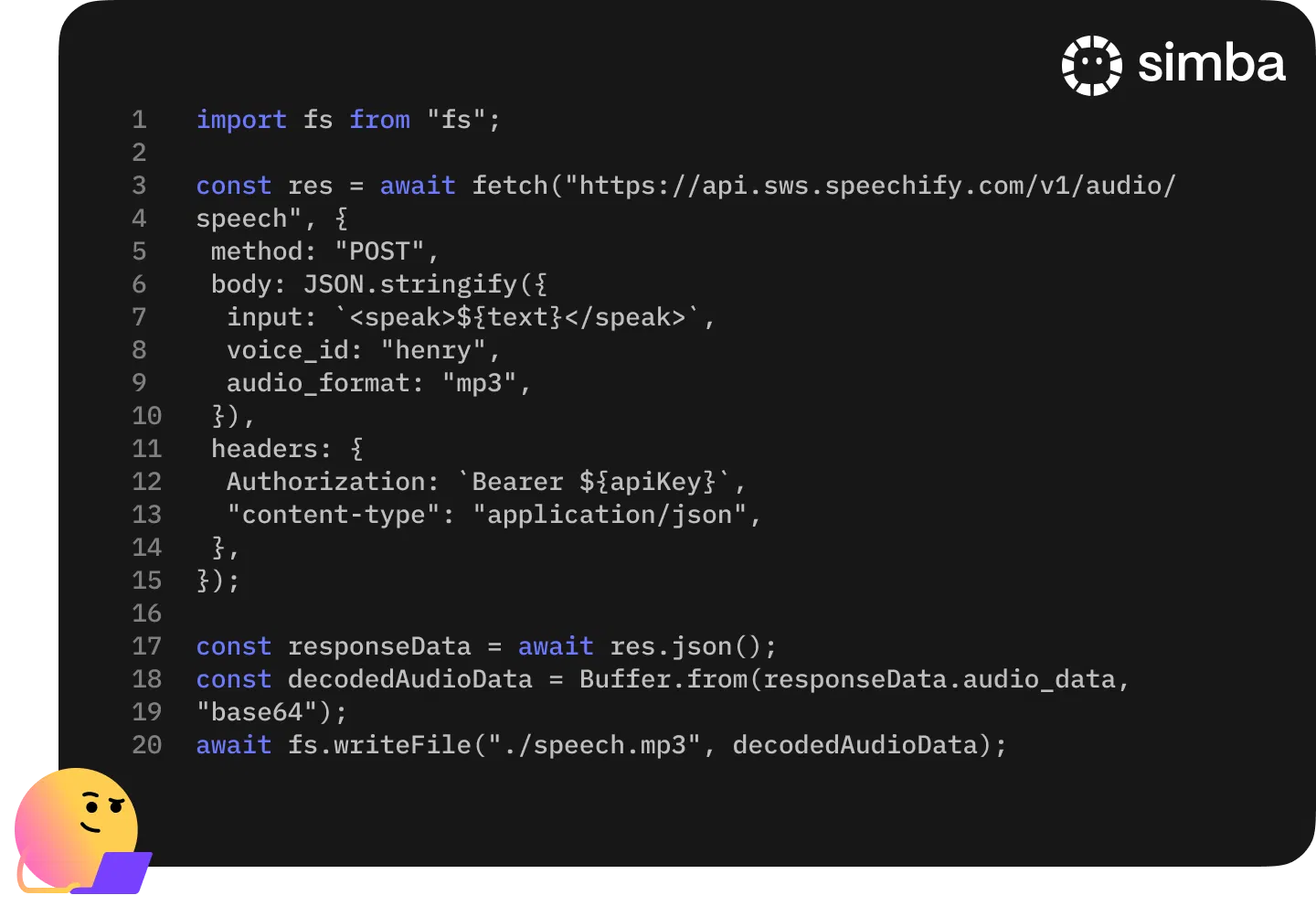
Bei der Entwicklung von KI-gesteuerten Lösungen wie KI-Sprachagenten ist die Auswahl der passenden Text-to-Speech (TTS) und Voice-API entscheidend, um realistische, hochwertige Sprachoutputs zu erzeugen. Speechify's TTS und AI Voice API hebt sich als robustes und vielseitiges Werkzeug für Entwickler hervor, die KI-Sprachfunktionen in ihre Plattformen integrieren möchten. Hier ist der Grund:
- Hyperrealistische Stimmen: SpeechifyText to Speech API bietet über 200 KI-Stimmen, die menschliche Sprachmuster täuschend echt nachahmen. Diese Stimmen sind äußerst natürlich und eignen sich ideal für verschiedene Anwendungen, einschließlich KI-Sprachagenten.
- Anpassungsflexibilität: SpeechifyText to Speech API ermöglicht es Entwicklern, Stimmen an spezifische Markenbedürfnisse anzupassen. Anpassungen in Ton, Tonhöhe, Aussprache, Emotion und Sprechgeschwindigkeit ermöglichen die Schaffung einzigartiger Stimmerlebnisse, die bei den Zielgruppen Anklang finden.
- Umfangreiche Sprach- und Dialektunterstützung: SpeechifyText to Speech API unterstützt mehr als 50 Sprachen, wie Spanisch, Englisch, Polnisch und Koreanisch, mit Dialektoptionen wie kastilischem und mexikanischem Spanisch. Diese umfangreiche Unterstützung macht es perfekt für die Erstellung von KI-Sprachagenten, die weltweit kommunizieren können.
- Skalierbar und zuverlässig: SpeechifyText to Speech API’s Infrastruktur ist darauf ausgelegt, hohe Nachfrage zu bewältigen und gewährleistet eine konsistente Leistung bei umfangreichen Sprachinteraktionen.
- Erweiterte KI-Fähigkeiten: SpeechifyText to Speech API integriert fortschrittliche KI-Funktionen wie emotionsreiche Sprache und kontextuelles Verständnis, die Benutzerinteraktionen bereichern und ein ansprechenderes Erlebnis bieten.
- Schnelle Reaktionszeiten: Mit niedriger Latenz, die für Echtzeitanwendungen wie virtuelle Assistenten entscheidend ist, sorgt SpeechifyText to Speech API für schnelle und effektive Sprachantworten.
- Stimmenklonen: SpeechifyText to Speech API umfasst Funktionen zur Erstellung benutzerdefinierter Stimmen und Stimmenklonen, die es Unternehmen ermöglichen, entweder spezifische Stimmen zu replizieren oder neue zu erstellen, die mit ihrer Markenidentität übereinstimmen.
Fazit
KI-Sprachagenten stellen eine transformative Technologie für die Kundenbetreuung, Gesundheitswesen und Callcenter-Branchen dar, unter anderem. Sie bieten die Möglichkeit, das Kundenerlebnis zu verbessern, Betriebskosten zu senken und die Effizienz durch Automatisierung und Echtzeithilfe zu steigern. Bei der Auswahl einer Plattform sollten Sie die Kompatibilität, Skalierbarkeit, Benutzeroberfläche und Kosten berücksichtigen, um sicherzustellen, dass die Lösung zu Ihren organisatorischen Bedürfnissen und Zielen passt.
FAQ
Was ist der Hauptvorteil der Nutzung eines KI-Sprachagenten?
Der Hauptvorteil von KI-Sprachagenten ist die Verbesserung des Kundenerlebnisses durch 24/7-Support und die Reduzierung der Arbeitsbelastung menschlicher Agenten durch die Automatisierung routinemäßiger Aufgaben.
Wie integrieren sich KI-Sprachagenten in bestehende Systeme?
KI-Sprachagenten integrieren sich über APIs, die es ihnen ermöglichen, mit verschiedenen Datenbanken und Softwareanwendungen zu kommunizieren und so nahtlose Arbeitsabläufe zu gewährleisten.
Können KI-Sprachagenten komplexe Kundeninteraktionen bewältigen?
Ja, mit Fortschritten in der Verarbeitung natürlicher Sprache und maschinellem Lernen können KI-Sprachassistenten zunehmend komplexere Interaktionen bewältigen und bei Bedarf kompliziertere Probleme an menschliche Agenten weiterleiten.
Gibt es branchenspezifische KI-Sprachassistenten?
Ja, viele Anbieter bieten Lösungen an, die auf bestimmte Branchen wie Gesundheitswesen oder Kundensupport zugeschnitten sind, um die Technologie an spezifische regulatorische und betriebliche Anforderungen anzupassen.

